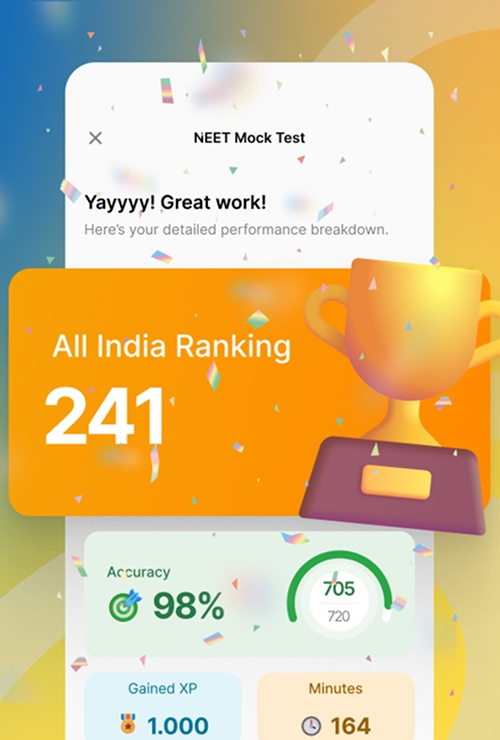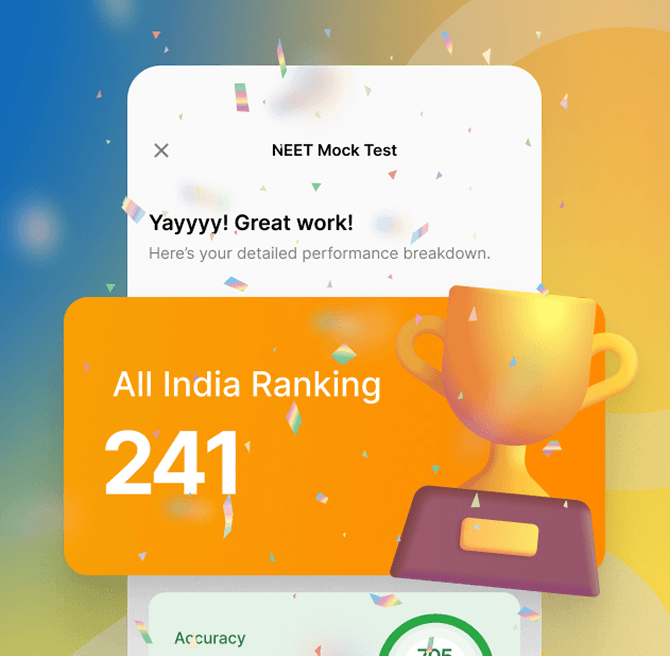
☝️ At a glance
- NEET is challenging due to its high competition and vast syllabus.
- Over 20 lakh candidates appear annually for a limited number of medical college seats.
- Success in NEET requires mastering NCERT books, practicing mock tests, and managing time effectively.
- Subject-wise focus: Physics (numerical), Chemistry (organic and inorganic), and Biology (factual).
- With the right strategy, consistent practice, and a focused mindset, cracking NEET is achievable.
The NEET UG exam is conducted by the National Testing Agency (NTA) for admissions into MBBS, BDS, and allied courses in government medical colleges and private colleges across India.


Exam pattern of NEET UG
Subjects | Total questions | Mandatory questions | Marks per section |
|---|---|---|---|
Physics | 50 | 45 | 180 |
Chemistry | 50 | 45 | 180 |
Biology (Botany + Zoology) | 100 | 90 | 360 |
Total Marks: 720
Duration: 3 hours 20 minutes
Marking Scheme: +4 for correct answers; -1 for incorrect answers.
The NEET syllabus consists of Physics, Chemistry, and Biology based on NCERT textbooks of Class 11 and 12.
Click here to download the NEET Zoology chapter-wise weightage
Download PDFIs NEET tough? factors affecting the difficulty level
1. High competition
The limited number of seats in government medical colleges makes NEET a competitive exam. Out of 20 lakh candidates, only around 1 lakh students secure seats in medical colleges.
Type of College | Seats Available |
|---|---|
Government Medical Colleges | ~50,000 |
Private Medical Colleges | ~45,000 |
2. Vast NEET syllabus
Covering the entire NEET syllabus—Physics, Chemistry, and Biology—requires a strong understanding of basic concepts, particularly from NCERT books.
Physics: Focuses on numerical problems and concepts.
Chemistry: Divided into physical chemistry, organic chemistry, and inorganic chemistry.
Biology: The biology section has the maximum weightage with questions often based on plant physiology and other topics.
3. Negative marking system
The fear of incorrect answers leading to negative marks makes NEET a tough exam. Candidates must answer carefully to avoid losing marks.
4. Time management
NEET requires answering 180 questions within 200 minutes, making time management critical. Candidates must balance speed with accuracy.
5. Question paper difficulty
The paper level can vary annually. The Biology section often contains straightforward factual questions, while Physics and Chemistry involve conceptual and formula-based questions.
Click here to download the NEET Botany chapter-wise weightage
Download PDFIs NEET tough compared to other competitive exams?
Let’s compare NEET with other competitive exams:
Exam | Difficulty level | Syllabus coverage | Competition |
|---|---|---|---|
NEET | High | Comprehensive | Very High |
JEE Main | Moderate to High | Conceptual | High |
AIIMS Entrance (Old) | High | Analytical & Conceptual | High |
The NEET exam stands out due to its massive competition and exhaustive syllabus.
Subject-wise analysis

1. Physics
Physics is often considered the most difficult section. It demands clarity in concepts, numerical skills, and quick calculations.
Focus areas: Mechanics, Optics, Thermodynamics, Electrodynamics.
Tip: Solve practice questions daily and refer to NCERT books for core concepts.
2. Chemistry
Organic Chemistry and Inorganic Chemistry can be challenging for students without repeated revisions.
Key topics: Physical Chemistry (numerical), Organic (reaction mechanisms), and Inorganic (theoretical).
Tip: Use reference books like OP Tandon and practice formula-based questions.
3. Biology
The Biology section accounts for 360 marks, making it the scoring subject. Most questions are statement-based and factual.
Focus topics: Plant Physiology, Genetics, Ecology, Human Physiology.
Tip: Thoroughly revise the NCERT syllabus as most questions are derived directly.
How to crack NEET: Preparation strategies
1. Create a structured study plan
Allocate time for each subject daily.
Focus on weak areas and prioritize high-yield topics.
2. Practice mock tests
Regularly attempt mock tests to improve exam temperament and manage time effectively.
3. Refer to NCERT books
The NCERT books form the base of the NEET syllabus. A significant portion of questions are formula-based or straightforward from NCERT.
4. Solve previous years’ question papers
Analyze the difficulty level of past question papers to stay updated on trends.
5. Stay focused and mentally healthy
Balancing mental health is crucial to handling exam stress. Take breaks and practice meditation to stay focused.
6. Leverage NEETsheet by futureMBBS
NEETsheet by futureMBBS is a comprehensive platform designed to help NEET aspirants excel in their preparation. It offers:
Daily live and recorded classes conducted by India’s best EdTech teachers with a proven track record of producing top NEET ranks.
Unlimited doubt-solving sessions to clarify concepts quickly.
Mock tests and practice questions to improve exam temperament, accuracy, and time management.
Personalized teaching strategies tailored to individual needs.
NEETsheet provides aspirants with the tools, expert guidance, and resources needed to streamline their preparation and secure admission to top medical colleges with a high NEET score.
Common challenges faced by NEET aspirants
Stress due to competition
Difficulty in completing the syllabus
Lack of time management
Confusion with multiple reference books
Tips to overcome NEET exam difficulty
Challenge | Solution |
|---|---|
High Syllabus Load | Follow a daily study timetable. |
Weak Subject Concepts | Use NCERT and trusted reference books. |
Exam Anxiety | Practice relaxation techniques. |
Poor Time Management | Attempt timed mock tests. |
Why NEET is not impossible to crack
While NEET is a challenging exam, it can be cracked with the right approach:
Strong foundation in basic concepts.
Consistent practice of mock tests.
Proper revision of the NCERT syllabus.
Conclusion
The perception that NEET is tough stems from its high competition, vast syllabus, and the need for accuracy in a time-limited format. However, with focused preparation, thorough knowledge of NCERT textbooks, and strategic time management, achieving a good score in NEET is absolutely possible.
Stay determined, solve previous years' question papers, and maintain a positive mindset to crack this competitive examand secure admission into a top medical college.
Click here to download the NEET 2026 official syllabus.
Download PDFFREQUENTLY ASKED QUESTIONS
FAQs about "NEET exam"
Is NEET tough to crack for an average student?
NEET can be challenging, but with consistent preparation and focus on NCERT, even average students can crack it.
What makes NEET a tough exam?
High competition, vast syllabus, and negative marking contribute to NEET’s difficulty level.
How many students appear for NEET each year?
Over 20 lakh candidates appear for the NEET exam annually.
What is the key to scoring high in NEET?
Focus on the NCERT syllabus, practice mock tests, and manage time efficiently during the exam.
Is NCERT enough for NEET preparation?
Yes, NCERT forms the foundation, but solving additional reference books and mock tests can enhance preparation.




